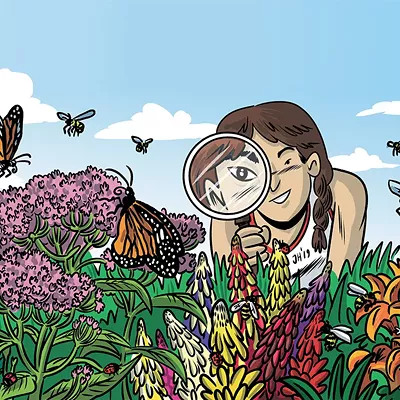I
grew up about three blocks from the Spokane River, and I never recall being bitten by any bugs really, except for the occasional mosquito that sucked a bit of my blood. However, in the past decade or so, "black flies" have appeared in our region. They're also known as no-see-ums or buffalo gnats. Evidently, they are local residents now because of the excellent job that's been done cleaning up the river. Only the adult black flies live outside the water, while the larvae are laid and hatched on the riverbed, and they thrive with highly oxygenated water, which we now have. Apparently, these flies are especially prevalent after winters with a heavy snowpack, as more flow means more grow. Also, the adults are more likely to be out seeking blood to feed their kin on overcast, windless, humid days.Many a parent has called my office alarmed and suspecting their child has cut their ear or scalp because of the sudden appearance of free flowing blood. These pests are endowed with a specialized cutting mouth and have saliva that contains an anesthetic, so you don't feel the bite, and an anti-coagulant, making their bites bleed a surprising amount.
Fortunately these flies do not transmit disease, although dogs can have a robust response to their bites giving them "black fly fever." I actually believe that humans can have a robust inflammatory response to these bites as well, giving them aches and even fevers. In addition to a pretty nasty, often bloody scab, the bitten will often be found to have bumps under the skin downstream from the bite ranging in size from a BB to an M&M. These are normal lymph nodes (and yes,there are normal lymph nodes, even though you only hear about the scary ones on medical TV shows), which serve as the recycling bins for the white blood cells that respond to inflammation. More inflammation means more cells, which means more packed recycling bins, and the "bins" are most noticeable in areas with less padding, like the scalp and neck. Lymph nodes don't move, they just fill and empty over several weeks, so if one is getting bites every few weeks upstream from the node, they will likely have nodes present all the way downstream.
Evidently the flies are attracted to sweat, as well as the CO2 that we exhale. So if you can't stay cool and hold your breath, you'll need to figure out a way to prevent the bites.
Unlike mosquitoes, black flies don't get through clothing, so sleeves, pants and hats are good for limiting their access. But the most attractive place for the flies tends to be at the hairline, over the neck, behind the ears — all areas which can be hard to cover in the summer.
So let's look for other ways to avoid these annoying bites. The Farmer's Almanac has several "natural" ways to try to do this, such as applying lavender, vanilla extract or pine scent to the neck and hairline. It is best to avoid sweet-smelling fragrances like perfumes and fabric softeners that may attract the flies. A fan on the porch may help keep the air moving and prevent flies from settling down. Apparently regularly eating garlic or drinking a tablespoon of apple cider vinegar three to four times a day for several days before expected exposure, and continuing on, can prevent them biting. Good luck with getting your children to drink ACV. One effective way to repel the flies is with a strategically applied bit of permethrin or picaridin over the neck and hairline. These are less stinky than DEET and may work even better for black flies. There are numerous brands to choose from.
Once bitten, it is best to wash the bites gently with soap and water and apply a little over-the-counter antibiotic ointment, or even Vaseline, to act as a barrier to keep the spots clean and dry. A topical corticosteroid is OK for itch, but try to stick with the ointments as creams can sting. A dose of Zyrtec or Claritin can be another way to take the edge off the itch. Aloe vera can simmer these bites down pretty well.
So, good luck, and just remember: Black flies are a sign of a healthy river — and that is important.
Matt Thompson is a pediatrician at Spokane's Kids Clinic.
















